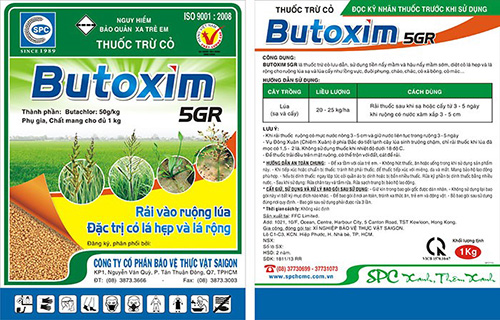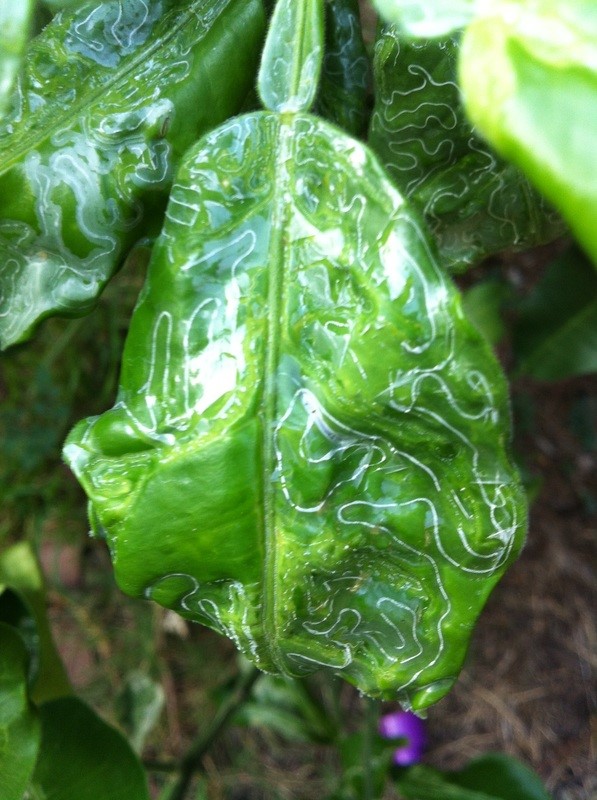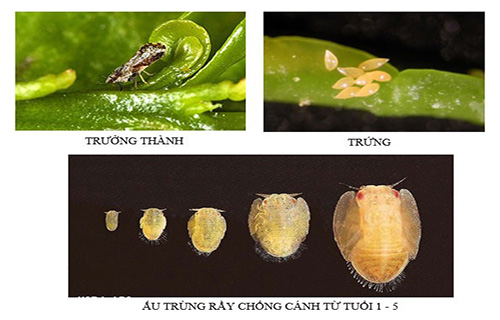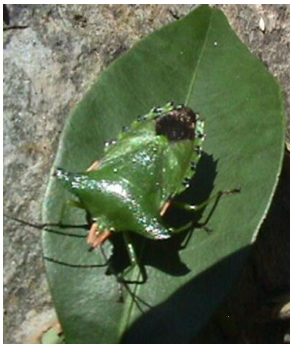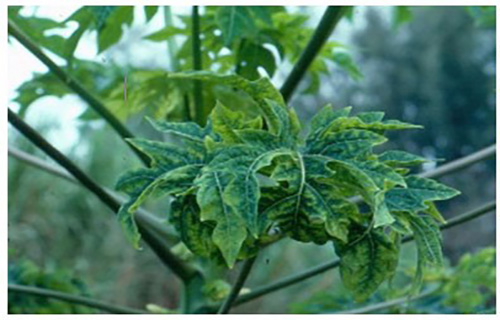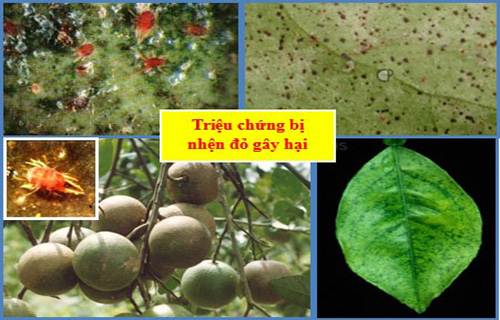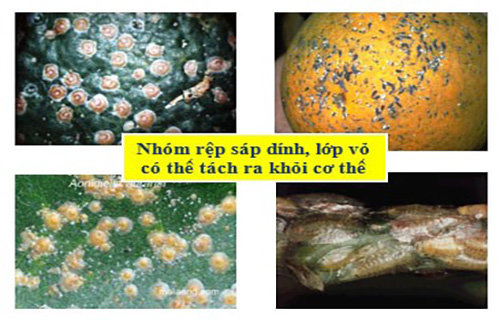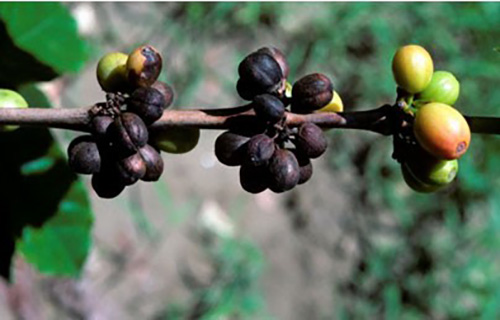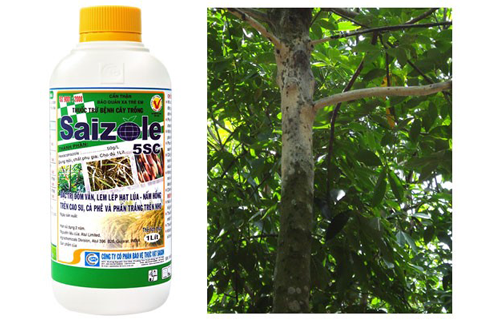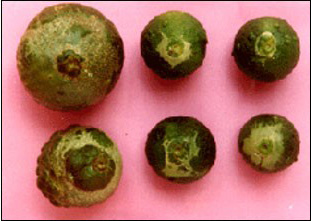|
CITRUS SNOW SCALE
21/06/2023
CITRUS SNOW SCALE 18/07/2022 Citrus snow scale also known as the citrus snow scale (Citrus snow scale), scientific name Unaspis citri, Comstock, belongs to the order Hemiptera, family Diaspididae including up to 2,400 species of mealybug with protective armor. The Citrus snow scale is considered a pest on all citrus trees, with the exception of mandarin trees. Distribution: The Citrus snow scales are native to Asia, but are now found in many citrus growing countries around the world Life cycle and biology:
Female citrus snow scales have 3 distinct stages: egg, larva and adult. Male citrus snow scales have these stages in addition to the pre-pupa and pupal stages. The 2-year- old male builds an armored shell to protect the bright orange body layer inside. 3-year-old or prepupal stage with obvious eye spots, Abdominal segment pointed, 4-year-old (pupal stage) almost motionless. Multiple generations of litters occur every year. The suitable temperature for the development of citrus snow scale is from 25 to 38 degrees Celsius.
Males and females are significantly different. Females: Oval, oyster-like, dark brown, 2 mm long, the armor is brown with a gray border, so the female is difficult to see when clinging to the trunk. Beneath the armored shell, the body is a light cream color. Males are smaller, 1mm long, white. both have edges running along the length of the body. Many white males clinging to the trunk and branches appear to be covered with a layer of white powder, hence the name citrus snow scale (Snow).
Adult female citrus snow scale Males: Male adults have bright orange wings, thread-shaped antennae with 10 segments, 4 purple eye spots, no mouth parts.
Immature male citrus snow scale and female adult. Eggs: Eggs are round, bright orange, about 0.3 mm long, laid one by one under the female protective shell and usually hatch 30 minutes to 3 hours after the egg is laid, after the egg hatches, new adults continue to lay other eggs. During 2-3 months, a female can lay up to 150 eggs. Eggs hatch, scales crawl to new habitats on the same tree, they can be dispersed by wind, birds, animals or people themselves. They randomly attach to cracks in the shell, begin to suck and form a protective waxy layer that covers the body. Males molt twice, females 4, the last two phases are pre-pupa and pupa with adult-like markings. The adult male is orange, has eyes, antennae and a pair of wings, but has no mouthpiece. The life cycle is about 2-3 months depending on the temperature.
Larvae: This stage begins after the citrus snow scale begins to hatch from the eggs. The larvae are called bugs, this is the dispersal stage. Larvae are round, bright yellow, and emerge in autumn, but can occur throughout the year. After the first molt, the male/female sex is distinguished and the larvae begin to form a waxy outer shell. Males have a white waxy shell, females are gray. Host: citrus snow scales spread on many citrus trees such as: + Lemon (Citrus aurantifolia), + Sour orange (Citrus aurantium). +Grapefruit (Citrus maxima). + Navel orange (Citrus sinensis). In many other parts of the world, the citrus snow scale infects other hosts including pineapple, custard apple, jackfruit, chili, mandarin, coconut, banana, guava, etc. However, it is mainly harmful to citrus trees. Harmful symptoms: The citrus snow scale sucks sap from the trunks and branches of old trees. Citrus snow scales can also be found on leaves and fruit, if the population is too dense. Initial symptoms weaken the tree and produce less fruit. If the high density persists, bark growth is affected and the bark cannot develop normally, the bark can become cracked and aged, the crack in the bark itself can be the door to help. borers or pathogens that invade and damage plants. citrus snow scales develop in high densities and cause damage in the dry season.
Branches damaged by citrus snow scales
The shell is cracked due to densely attached citrus snow scales Prevention: - Biological measures: Using parasitic and predatory natural enemies such as the parasitic wasp Aphytis lingnanensis, the ladybug Chilochorus circumdatus. - Cultivation methods: Since citrus snow scales are mobile throughout their life cycle, the key to prevention is to limit the spread of bedbugs. Citrus snow scales can be spread by wind, gardening tools, people, pollinators, agricultural tools such as pruning shears, fruit vibrators, so it is important to clean farm equipment before going to a new planting site, and farmers need to shake off their clothes before entering the new planting area.
Varieties: No resistant varieties have been recorded, but grafted branches must be free of citrus snow scales if pruned, spray insecticides Chemical measures: Field visit is an important factor before deciding to use pesticides. If citrus snow scales are few, they can be cleaned with a brush, then about a week later it can be done again. If citrus snow scales are too much to use pesticides, you can refer to the products below + Sulfur-based products such as Sulox 80WP + Spraying SK Enspray 99EC mineral oil or cleaning solution (Soap) because citrus snow scales are covered with protective wax, spraying with mineral oil or cleaning solution will dissolve the wax layer, the body of the citrus snow scale will lose water and die. Mineral oil/soap can be alternately sprayed with Sulox 80WP sulfur base. + Or can spray Sec Saigon 25EC, should be mixed with SK Enspray 99EC mineral oil (50 ml/25 L). Note because the citrus snow scale has many layers on top of each other, maybe 7-8 layers, so it is necessary to spray several times, each time 5-7 days apart, to kill the citrus snow scales lying underneath.
|
To prevent, in addition to plowing and burying weed seeds, collecting weed stalks and stumps left after tilling the land to burn, not letting weeds produce seeds in production fields, etc., the use of chemical products is still a measure. optimal because of its ability to thoroughly kill weeds, reduce labor and take advantage of more time than manual weeding.
Miner has the scientific name Phyllocnistis citrella Staint., family Phyllocnistidae, order Lepidoptera. The miner occurs in many countries in the tropics and subtropics. The main host of the miner is the citrus family - Rutaceae. In addition, the miner also attacks mangosteen and some other plants.
Adult is a small planthopper, with a body 2-3 mm long, the whole body is ash gray, slightly greenish, the wings are opaque with many small brown spots.Eggs are oval, 0.3 mm long, have a pointed end and are attached directly to the leaf surface, leaf axils.
Green bugs specialize in the fruit of citrus groups (oranges, tangerines, lemons, grapefruits, kumquats...), some people call them orange bugs, or orange suckers. Their scientific name is Rhynchocoris poseidon or Rhynchocoris humeralis.
In Vietnam, yellow leaf curl disease is very common on papaya trees, especially the disease is often severe in areas of high and continuous planting, areas with hot and arid climates. The disease has significantly reduced the yield and quality of papaya. Gardens that are infected early when the plants are young may not yield. However, up to now, many gardeners still do not know the cause and how to fix it.
Spider mites are common pests on citrus trees, especially in hot and dry climates that are suitable for spiders to grow and cause severe damage.The group of harmful spiders is usually very small in size, unlike the natural enemy spiders.
This group includes species that are generally very small in size, causing damage by sucking plant sap (on leaves, fruits, branches, stems).
There are many species of mealybugs present on the group of Oranges,Tangerines,Grapefruits and Lemons (Citrus), which can be divided into 2 groups:
+ Group of sticky mealybugs with common varieties such as Lepidosaphes, Aonidiella, Coccus and Saissetia.
+ Group of flower mealybugs with common genera and species such as Pseudococcus, Planococcus and Icerya purchasi.
Dry branches and berries disease often appear to be common damage on coffee gardens during the rainy season. The disease causes death of branchs, dry fruit, severely affects the canopy structure and coffee yield if not paid attention to prevention.
Pink disease commonly causes diseases on rubber plantations in the rainy season, especially on garden from 4-8 years old. This year, rubber has to go through a period of severe drought, weakening the tree, so now in tnshe rainy season it is easy to get infected. Therefore, it is necessary to pay attention to good management to avoid affecting the garden.
In recent years, the area of citrus has been expanded because it is a fruit tree with high economic efficiency. However, in order to sell at a high price, not only in quality but consumers also require the external beauty of the fruit, so pest management on citrus is a matter of great concern to farmers. The hot season is a favorable condition for thrips to develop and cause damage, affecting the commercial value of fruit.
- Headquarters
- SAIGON PLANT PROTECTION JOINT STOCK COMPANY
- RQ 1, Nguyen Van Quy St., Tan Thuan Ward, HCM City
- Tax code: 0300632232
- Tel: (028) 38 733 295 - 38 732 077
- Fax: (028) 38 733 003 - 38 733 391
- Website: www.spchcmc.vn - Email: info@spchcmc.vn
- SAIGON PLANT PROTECTION COMPANY
- SAIGON PLANT PROTECTION JOINT STOCK ENTERPRISE
- Lot C1-C3 Hiep Phuoc Industrial Park, Hiep Phuoc Commune, HCM City
- Tel: (028) 3873 4089 - Fax: (028) 3873 4086
- Affiliated Unit
-
- Quick Links
- Home
- About us
- Career Opportunities









